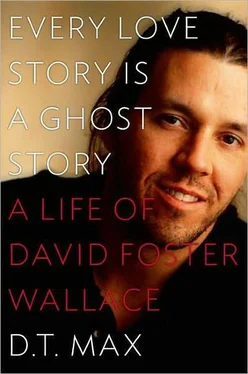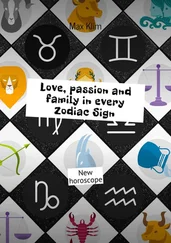Soon Green invited him to spend Christmas with her in Hawaii. He was sad — Jeeves had just died (“the closest thing to a child that I had,” he wrote Morrow). To make sure they could get along when they got there, he had first visited her for a day in Marin County, where she lived. They had fun, and he amazed her afterward by writing a letter describing every detail of her house, down to the paint-splattered shoes in the hallway. He told her the depressed person was really him. Wallace wanted to go slow, so to encourage him in Hawaii, Green sent him a sheet with a hole already cut out. In December they left, surprising Wallace’s friends, who knew how little he liked to travel. In Hawaii, they watched movies and walked on the beach and talked constantly. Green swam, while Wallace avoided the water. He found the islands, he wrote Morrow afterward, “much less touristy or vulgar than I’d thought, and haunted and sad in a good way.” He also liked that there were no bugs. Before they returned home, he asked Green if she would marry him. But Green had a teenage son, Stirling, who danced, and she wanted to be near a good ballet program. On his return Wallace told Morrow that he was “pretty much hopelessly in love with a female in Marin County who’s a showing painter.”
Wallace settled in to Claremont. He found a recovery group he liked and, touched by California culture, drank his “breakfast vomit,” lifted weights, ran with Werner, and even bought a new tennis racket. He festooned his walls with shark attack clippings and pages of the Long Thing. When school began, he found he liked teaching at Pomona more than he had expected. For one thing, there were no graduate students (and thus no budding literary theorists), and the undergraduates were more capable than at Illinois State — he was in the “land of 1600 SAT scores, apparently” as he described Pomona to Morrow. He found Fraden, the department head, exactly how he hoped she’d be. They soon had a standing date to watch Buffy the Vampire Slayer every Tuesday night at her house. As ever, Wallace tried to tamp down any sense that he was special; when the students in his fiction class had a “Dress Like DFW Day,” he let it be known that it was only sort of funny.
Best of all, he only had to teach one course each semester and never had to sit on a committee. “We’re hiring you to write — you have to keep writing,” Fraden had told him. “I have a lottery-prize-type gig at Pomona,” Wallace bragged to the Believer in 2003. “I get to do more or less what I want.” Any grumblings among the faculty, for whom undergraduate education was a calling, were soon laid to rest as word of Wallace’s unmistakable dedication to teaching emerged — for example, the eleven impromptu mini-papers he required from students in “Literary Interpretation,” or the comments in different-colored inks for each reading that he scrawled in the margins of students’ stories. He took teaching seriously and made sure his students did so too. Once, when the school registrar wanted to audit Wallace’s course, on the literary essay, Wallace turned her down because she would have had to miss too many classes for faculty meetings.
His grammar obsession quickly became well known. “On a scale of 1 to 10, this is an 11,” he would tell students, seeing a particular blunder. Or, “This actually hurts my brain.” He would consult his mother’s book, Practically Painless English , to answer any challenges and would sometimes trot out her old feint of fake-coughing when a student fell into a grammatical solecism. He used the modifier “only” in class to show the power careful usage wielded:
You have been entrusted to feed your neighbor’s dog for a week while he (the neighbor) is out of town. The neighbor returns home; something has gone awry; you are questioned.
“I fed the dog.”
“Did you feed the parakeet?”
“I fed only the dog.”
“Did anyone else feed the dog?”
“ Only I fed the dog.”
“Did you fondle/molest the dog?”
“I only fed the dog!”
His voice cracked with pleasure as he spoke the last line.
Wallace stood out in Claremont. His earnestness, part midwestern childhood, part defense mechanism, was unusual on a campus where the tone was muted cool, sun-drenched Ivy. Wallace once tried to get approved a course called “Extremely Advanced Essay Writing,” but the registrar objected that no “Advanced Essay Writing” class had been offered before. Still, Wallace’s arrival was a triumph for both the department and the university, this middle-aged monstre sacré in his iconoclastic outfits — bandana, beaten-up hiking shorts, and double athletic socks inside unlaced hiking boots. The Los Angeles Times , in covering his arrival, noted with approval his Pomona College sweatshirt with the arms cut off.
Wallace very much wanted Green to be in the same city with him. He did not want to wait until Stirling graduated high school in 2005. In the summer of 2003, Green bought a house in Cave Creek, Arizona. Wallace made the six-hour drive once a week. He worked in an upstairs room and read Tom Clancy novels by the pool, “burning his shoulders to a crisp,” as Green remembers. There was a local recovery group he liked too.
In August 2003 Wallace went to Maine with Green on an assignment for Gourmet . She had never met his parents before but his relationship with his mother had gotten easier with time and they bonded as a group. His editors were hoping he would reprise his role as the elite’s correspondent in the heartland, but, having promised to do his “own eccentric researching,” he came back with something decidedly more delicate than the state fair or the cruise piece. He had always been interested in what animals feel — their inability to protect themselves touched him as human pain didn’t — and over the years he had begun to wonder what right we had to be cruel to them. In Maine he found a scene worthy of Hogarth: thousands of lobsters being boiled alive at the “enormous, pungent and extremely well-marketed Maine Lobster Festival,” where “friend and stranger alike sit cheek by jowl, cracking and chewing and dribbling. It’s hot, and the sagged roof traps the steam and the smells.” Who, he wanted to know, gave us such dominion? But Wallace was and had always been averse to hectoring — it seemed rude to him — and in the piece he took pains to distance himself, physically and rhetorically, from the PETA representative, “Mr. William R. Rivas-Rivas,” who, he writes, papered the festival at the harbor with his leaflet “Being Boiled Hurts.” Instead, Wallace posed the problem with lobster eating as a series of ethical questions, writing in the faux-naïve voice of the curious midwestern boy he still in some ways was: “Is it all right to boil a sentient creature alive just for our gustatory pleasure?” He went on slyly:
For those Gourmet readers who enjoy well-prepared and — presented meals involving beef, veal, lamb, pork, chicken, lobster, etc.: Do you think much about the (possible) moral status and (probable) suffering of the animals involved? If you do, what ethical convictions have you worked out that permit you not just to eat but to savor and enjoy flesh-based viands?…If, on the other hand, you’ll have no truck with [such] confusions and convictions…what makes it feel truly okay, inside, to just dimiss the whole thing out of hand? That is, is your refusal to think about any of this the product of actual thought, or is it just that you don’t want to think about it? And if the latter, why not? Do you ever think, even idly, about the possible reasons for your reluctance to think about it? I am not trying to bait anyone here — I’m genuinely curious. After all, isn’t being extra aware and attentive and thoughtful about one’s food and its overall context part of what distinguishes a real gourmet?
Читать дальше












